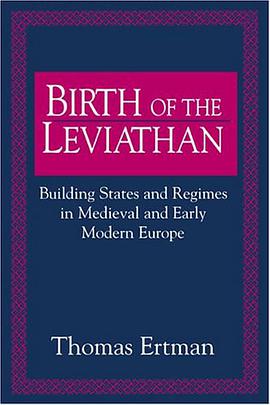Birth of the Leviathan
内容简介
For many years scholars have sought to explain why the European states which emerged in the period before the French Revolution developed along such different lines. Why did some become absolutist and others constitutionalist? What enabled some to develop bureaucratic administrative systems, while others remained dependent upon patrimonial practices? This book presents a new theory of state-building in medieval and early modern Europe. Ertman argues that two factors - the organisation of local government at the time of state formation and the timing of sustained geo-military competition - can explain most of the variation in political regimes and in state infrastructures found across the continent during the second half of the eighteenth century. Drawing on insights developed in historical sociology, comparative politics, and economic history, this book makes a compelling case for the value of interdisciplinary approaches to the study of political development.
......(更多)
作者简介
Thomas Ertman
Associate Professor of Sociology; Director of Undergraduate Studies
Ph.D. 1990, M.A. 1985, B.A. 1981, Harvard University.
Office Address: 295 Lafayette St., Room 4110
Phone: (212) 998-8359
Email: thomas.ertman@nyu.edu
Areas of Research/Interest: Comparative/historical sociology; political sociology; social theory; sociology of the arts.
Bio:
For as far back as I can remember, I have struggled to understand why Europe--and especially Germany--left the path of peace and prosperity after 1914 for that of war and genocide. While an undergraduate, I thought philosophy might throw some light on this problem, but I found its answers too abstract. It was the intellectual dynamism of historical sociology in the early 1980's, open as it was to the latest developments in history, social theory and political science, that persuaded me that I could best pursue this question further as a graduate student in sociology.
Select Publications:
Birth of the Leviathan: Building States and Regimes in Medieval and Early Modern Europe. Cambridge University Press, 1997. Barrington Moore Prize of the ASA 1998.
"Democracy and Dictatorship in Interwar Western Europe Revisited." World Politics, April 1998.
Taming the Leviathan: Building Democratic Nation-States in 19th and 20th Century Western Europe. (In Progress.)
......(更多)
目录
1. Introduction
2. The origins of patrimonial absolutism in Latin Europe
3. The triumph of patrimonial absolutism and the failure of reform in Latin Europe, c. 1500–1789
4. Bureaucratic constitutionalism in Britain
5. Bureaucratic absolutism in Germany
6. Patrimonial constitutionalism in Hungary and Poland and its premature demise in Scandinavia
7. Conclusion.
......(更多)
读书文摘
第二,如果私人占有的官职与任命—委托关系结合在一起,没有为削减预算留下任何空间,那么,“国家贵族”(noblesse d'etat)和其他有特权的群体所拥有的政治影响扩张了捐税的基础。这是回应财政需求不断增加的另一个逻辑,但也是不可能的。
......(更多)






